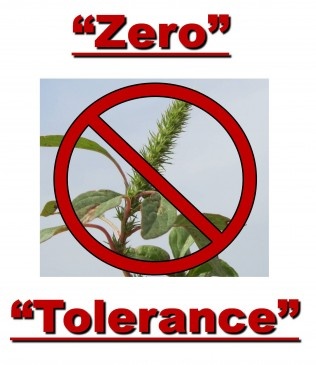Soybean Farmers Declare War on Palmer Amaranth

Palmer amaranth, also known as pigweed, has plagued U.S. soybean farmers for many years. Before the advent of the herbicide glyphosate, as well as glyphosate-resistant soybean varieties, farmers had to battle this vicious weed with armies of hoe crews. Farmers thought those days were over.
Until the past few years, glyphosate proved to be a reliable method of eradicating Palmer amaranth, but unfortunately, more and more cases of glyphosate-resistant pigweed have shown up in soybean farmers’ fields. These herbicide-resistant weeds have not yet spread throughout the United States, but farmers in Arkansas and surrounding southern states know all too well about this growing problem. They urge other farmers to start planning for it now.
Although some herbicide options can fight Palmer amaranth, those alternatives may not be consistently effective. In addition, the weed can produce as many as 1.5 million seeds in a growing season. What starts out as a few missed plants one year can make a field almost completely unsalvageable within three years.
The weed’s devastating effects have led some soybean farmers in Arkansas to adopt a ‘Zero Tolerance’ policy against it. This calls for communities of farmers to commit to making their fields free of Palmer amaranth. The University Of Arkansas Division Of Agriculture’s Zero Tolerance program addresses this aggressive weed with the attitude that no pigweed plant will be allowed to produce seed. For soybean farmers, that could mean using a hoe or pulling and carrying the weed out of the field to prevent plants from dropping seed in the soil. Methods like these may be the only options until researchers identify a proven, alternative control method.
By Ken Smith, Ph.D., extension weed scientist, University of Arkansas Division of Agriculture
Until the past few years, glyphosate proved to be a reliable method of eradicating Palmer amaranth, but unfortunately, more and more cases of glyphosate-resistant pigweed have shown up in soybean farmers’ fields. These herbicide-resistant weeds have not yet spread throughout the United States, but farmers in Arkansas and surrounding southern states know all too well about this growing problem. They urge other farmers to start planning for it now.
Although some herbicide options can fight Palmer amaranth, those alternatives may not be consistently effective. In addition, the weed can produce as many as 1.5 million seeds in a growing season. What starts out as a few missed plants one year can make a field almost completely unsalvageable within three years.
The weed’s devastating effects have led some soybean farmers in Arkansas to adopt a ‘Zero Tolerance’ policy against it. This calls for communities of farmers to commit to making their fields free of Palmer amaranth. The University Of Arkansas Division Of Agriculture’s Zero Tolerance program addresses this aggressive weed with the attitude that no pigweed plant will be allowed to produce seed. For soybean farmers, that could mean using a hoe or pulling and carrying the weed out of the field to prevent plants from dropping seed in the soil. Methods like these may be the only options until researchers identify a proven, alternative control method.
By Ken Smith, Ph.D., extension weed scientist, University of Arkansas Division of Agriculture
